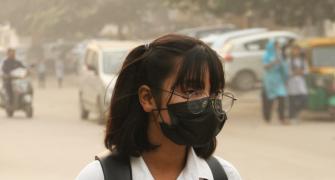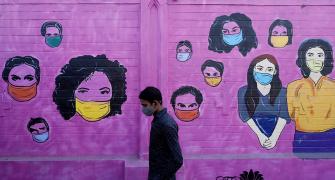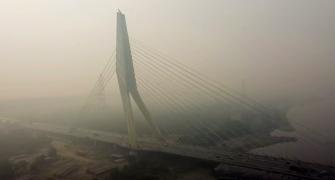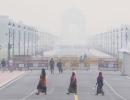Pakistan on Monday blamed winds from India for worsening smog in Lahore, urging the Indian authorities to take up the matter seriously, after the air quality index in the capital city of Pakistan's Punjab province hit a record high over the weekend.

Toxic grey smog has sickened tens of thousands of people, mainly children and elderly people, since last month when the air quality started worsening in Lahore, the city bordering India.
The concentration of PM 2.5, or tiny particulate matter, in the air, approached 450, considered hazardous, the Punjab Environment Protection Department said.
"The wind direction brings air from India into Pakistan, yet India does not seem to be taking this problem as seriously as it should," Punjab Information Minister Azma Bokhari told the media here.
She urged the Indian side of Punjab state to take this matter seriously.
"Delhi ranks first in smog levels today, with Lahore following closely in second place. Delhi's air quality index is around 393, while Lahore's is close to 280," she said, adding that China has been battling smog for the past 26 years.
Earlier, Punjab senior minister Marriyum Aurangzeb said the province was going to request the Pakistan Foreign Office to take up the issue of cross-border pollution with India.
"The easterly winds from Amritsar and Chandigarh are spiking the air quality index in Lahore to over 1,000 for the past two days," she said.
"The wind from India towards Lahore taking the smog to dangerous levels and the wind is likely to sustain its direction for at least next week. The people should take care of themselves by avoiding unnecessarily coming out of their houses. The elderly and children should be particularly careful," Aurangzeb said.
Punjab Chief Minister Maryam Nawaz also called for climate diplomacy with India and said she would soon write to the chief minister of the Indian side of Punjab to jointly address the issue of smog.
Meanwhile, the Punjab government has closed primary schools in Lahore for a week in the wake of rising smog.
The government has already closed schools for specially-abled children for three months.
Lahore was once known as a city of gardens, which were ubiquitous during the Mughal era from the 16th to 19th centuries. However, rapid urbanisation and surging population growth have left little room for greenery.










